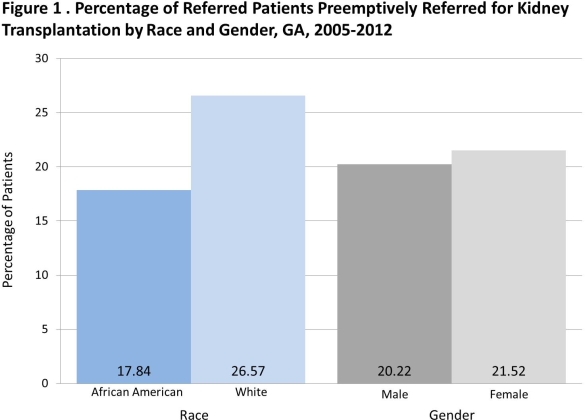Racial Disparities in Preemptive Kidney Transplant Referrals in Georgia: Data from the RaDIANT Community Study
1Emory University, Atlanta
2Southeastern Kidney Council, Raleigh
3Piedmont Hospital, Atlanta, GA
4Georgia Regents University, Augusta, GA.
Meeting: 2015 American Transplant Congress
Abstract number: C35
Keywords: Kidney, Kidney transplantation
Session Information
Session Name: Poster Session C: Disparities in Healthcare Access
Session Type: Poster Session
Date: Monday, May 4, 2015
Session Time: 5:30pm-6:30pm
 Presentation Time: 5:30pm-6:30pm
Presentation Time: 5:30pm-6:30pm
Location: Exhibit Hall E
Purpose
Access to kidney transplantation (KTx) before initiation of dialysis is associated with improved patient and graft survival, enhanced quality of life, and decreased hospital readmissions following KTx. While national data have shown racial disparities in access to waitlisting and KTx, it is currently unknown if these disparities exist with preemptive referral to KTx.
Methods
We linked data from the Reducing Disparities In Access to kidNey Transplantation (RaDIANT) Community Study cohort of 8,573 incident adult end-stage renal disease (ESRD) patients referred for KTx to any of the three Georgia (GA) transplant centers in 2005-2012 to United States Renal Data System data to determine time from start of ESRD treatment to first referral. Preemptive referral was defined as referral date occurring before ESRD start. Logistic regression determined the patient factors associated with preemptive KTx referral.
Results
Among those referred, 1,781 (20.8%) were referred preemptively. Patients with preemptive referrals were more likely to be waitlisted (44.8%) and receive a KTx (19.8%) compared to patients with non-preemptive referrals (28.4% and 8.6% respectively) (p<0.0001) (Figure). Multivariable logistic regression showed that African Americans were 39% (OR=0.61 95% CI 0.53, 0.69) less likely to be preemptively referred for KTx compared to whites. Women were 22% (OR=1.22; 95% CI 1.08, 1.38) more likely than men to be preemptively referred while individuals with heart disease (vs. no heart disease) were less likely to be preemptively referred  .
.
Conclusion
In Georgia, we found that African Americans are less likely to be preemptively referred for KTx than whites. Overall, preemptively referred patients were significantly more likely to receive a KTx than patients referred after starting dialysis. Collection of national referral data will be necessary to examine whether these results are generalizable across the United States
To cite this abstract in AMA style:
Gander J, Plantinga L, Basu M, Sauls L, Pastan S, Gibney E, Mulloy L, Patzer R. Racial Disparities in Preemptive Kidney Transplant Referrals in Georgia: Data from the RaDIANT Community Study [abstract]. Am J Transplant. 2015; 15 (suppl 3). https://atcmeetingabstracts.com/abstract/racial-disparities-in-preemptive-kidney-transplant-referrals-in-georgia-data-from-the-radiant-community-study/. Accessed February 14, 2026.« Back to 2015 American Transplant Congress
